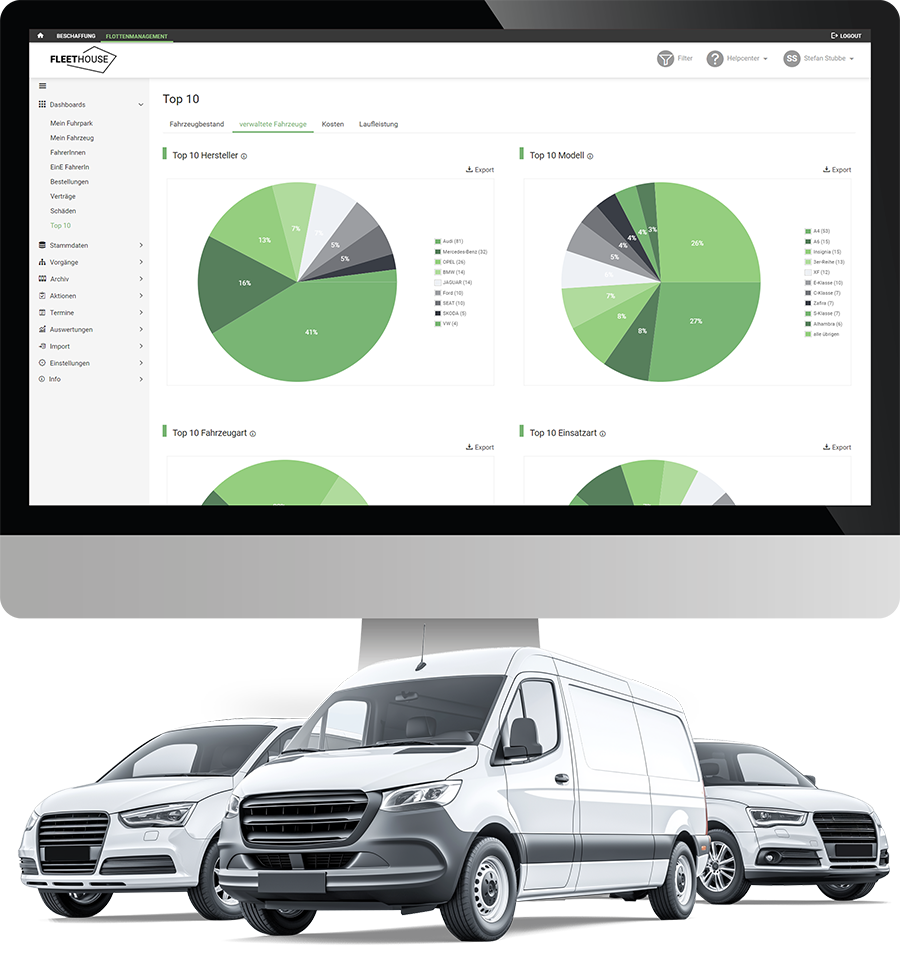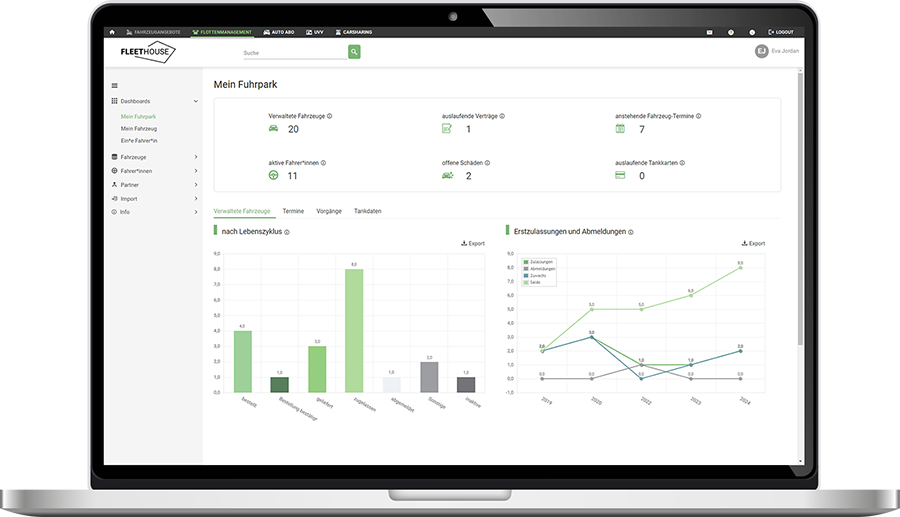Fleet management, also known as vehicle fleet management, is of central importance for the efficient organization of vehicle fleets. Companies with a fleet of vehicles, such as transport companies, delivery services or public authorities, require well-coordinated fleet management in order to optimize costs and ensure operations .
Professional fleet management ensures that the vehicle fleet not only functions smoothly, but is also operated economically and sustainably. In addition to managing vehicles, monitoring processes, complying with legal requirements and analyzing energy consumption also play a key role.
The goal: a high-performance and future-proof organization of the vehicles in line with the requirements of the company and its employees.
In this article, we show you which aspects are important.
Contents
What is fleet management?
Fleet management encompasses the effective management of vehicle fleets in companies and organizations. The aim of fleet management is to make optimum use of the fleet in order to increase productivity, reduce costs and ensure safety. Vehicles include cars, trucks, buses, ships and airplanes. Special vehicles including superstructures, such as a fire truck, are also part of the fleet.
Fleet management tasks include the selection of suitable vehicles, cost controlling, vehicle safety and compliance with legal regulations. Another important function of fleet management is the monitoring of fuel consumption and the analysis of operating costs in order to identify potential economic savings. Digital tools also enable the precise planning of maintenance intervals and the management of logbooks, making processes more transparent and efficient.
In the area of fleet management, the organization of pool vehicles also plays a central role in optimizing the use of resources within the company. With a comprehensive approach, companies can not only increase efficiency, but also develop more sustainable mobility strategies.
Modern technologies such as fleet management software play a decisive role by automating processes and making decisions easier.
Why is fleet management important?
Well-planned fleet management is important as it enables companies with vehicles to ensure corporate mobility at optimal cost . The more closely the fleet is linked to business activities, the more important it is to ensure smooth mobility in order to avoid downtime and loss of earnings.
Aspects such as ecology, employee motivation ( company car issue) or corporate image also play a role in the alignment of the fleet, which should fit in with the company’s strategic goals. Another important aspect is compliance with regulations in order to avoid legal consequences – for example in the event of an accident.

Digitize your Vehicle Fleet
With Fleethouse, you can organize your operational processes efficiently, reduce costs and increase safety in your fleet.
Advantages of digital fleet management
Fleet management involves many recurring tasks that can be automated and thus accelerated by fleet management software. In addition, data from different sources such as leasing rates, tank data and maintenance invoices can be consolidated. A digital solution for fleet management is indispensable today and offers many advantages:
- Central data maintenance: Manage all fleet data in one place. This not only makes it easier to access important information, but also saves a lot of time when analyzing the data.
- Appointment management: With fleet software, you can keep an eye on important appointments and deadlines. Notifications remind you of upcoming or overdue appointments. This also makes it easier to plan maintenance work in order to minimize downtimes and extend the service life of the vehicles.
- Cost and fuel management: The costs and consumption per vehicle are broken down transparently so that cost drivers can be quickly identified.
- Direct communication with drivers: apps can be used to quickly check driving licenses or report damage, for example.
There are many types of fleet software, depending on a company’s requirements. Fleethouse fleet management has been specially developed for easy entry into digital fleet management. Simply register, import vehicles and drivers, record costs and appointments. You can add further functions as required.
Digital tools also offer advantages when it comes to monitoring processes and complying with legal regulations, such as regularly checking maintenance intervals or maintaining a logbook.
Another advantage is better control over the entire fleet: fleet managers can use automated evaluations to see exactly which vehicles are being used to capacity and where there is potential for savings. This not only enables more efficient use of the mobility fleet, but also the development of sustainable mobility strategies.
In addition, digital fleet management helps to simplify communication with suppliers and service providers, significantly reducing the overall administrative burden.
In our free guide, we give you tips on how a software solution can make your day-to-day fleet work easier: Getting started with digital fleet management
Webinar: Checklist for fleet management
In our free webinar, you will receive valuable tips on what to look out for when managing a vehicle fleet – from owner liability to the right form of financing.
What are the tasks of a fleet manager?
In order to use the fleet as effectively as possible while keeping operating costs low, fleet managers should pay particular attention to the following tasks:
- Fuel management: Monitoring consumption can reduce fuel costs and reduce the fleet’s environmental footprint.
- Maintenance and repairs: Regular maintenance and timely repairs help to ensure the operational readiness of the vehicles and minimize unplanned downtimes.
- Evaluations and reports: By analyzing fleet data, optimization potential can be identified and well-founded decisions can be made.
- Owner liability: There are a number of legal requirements to be observed in the vehicle fleet. These include owner liability obligations such as driver’s license checks and driver instruction in accordance with accident prevention regulations. This should minimize the risk of accidents and increase driver safety.
- Controlling the costs incurred by the vehicle fleet. A total cost analysis refers to both the acquisition costs and the operating costs, such as insurance and fuel
- Safety: it must be ensured that all requirements for vehicles and drivers are met.
What does a fleet management provider do?
A fleet management provider takes over the entire fleet management or certain tasks in the fleet. Outsourcing can relieve both the budget and the personnel resources in the fleet. Fleet service providers or full-service leasing companies can also support fleet managers with the relevant expertise.
Operational processes in particular, such as claims management, repairs or cost recording, can be outsourced. However, you should carefully analyze whether a fleet management provider is suitable for you. Outsourcing fleet management tasks costs money and can result in dependence on the service provider.
Another advantage of working with a fleet management provider is the use of modern fleet management software. This enables efficient organization of processes such as vehicle tracking, deadline monitoring and cost transparency. Service providers often provide digital solutions that make the work of the fleet manager easier and at the same time improve the safety and efficiency of the mobility fleet.
Close coordination with the service provider is important to ensure that the specific requirements of your mobility fleet are taken into account with the fleet management software.
Fleet management Reduce costs
Vehicle fleets account for a large block of costs. Both fixed and variable costs are incurred.
- Fixed costs are regularly incurred in fleet management, regardless of how the vehicles are used. Examples include inspection costs, main and exhaust gas inspections (HU/AU), vehicle tax, parking fees (e.g. costs for garages or parking spaces), personnel costs, insurance, leasing fees.
- Variable costs in the vehicle fleet depend, among other things, on the utilization and actual use of the vehicles. They can rise or fall flexibly. Examples include fuel costs or charging costs for electric cars, maintenance and repair costs, tires or tolls.
Appropriate evaluations are an important lever for reducing fleet costs. Fleet managers can identify outliers and potential savings here. For example, monitoring fuel consumption and prices enables lower operating costs. Strategic approaches to reducing costs can include regular maintenance or accident prevention. Follow-up costs in the form of downtime or replacement mobility can also be prevented in this way. Specifications such as company car regulations can help to ensure that the fleet is set up cost-efficiently in the long term.

Do you want to keep an eye on your fleet costs?
Register with Fleethouse and monitor the costs of your fleet digitally in one place.
Procurement in the fleet
Fleet management starts with procurement. It forms the basis for an efficient and cost-saving organization of the entire mobility fleet.
Well thought-out procurement ensures that the vehicles are optimally matched to the company’s requirements and the planned areas of use. Choosing the right vehicles can have a long-term impact on operating costs, the efficiency of the mobility fleet and driver satisfaction.
The procurement of vehicles is an important step that fleet managers need to plan carefully:
- Needs analysis: Analyze the company’s needs and select the vehicle types that best meet the requirements. Pay attention to aspects such as loading area, capacity, fuel efficiency and environmental standards.
- Budget and Total Cost of Ownership (TCO): Set a budget that takes into account the acquisition costs, operating costs, maintenance and insurance of the vehicles. The total cost of ownership should be calculated over the entire useful life of the vehicles.
- Vehicle manufacturers and dealers: Compare different brands and look for trustworthy dealers who supply high-quality vehicles and offer good customer service.
- Drive technology: Consider modern technologies such as hybrid or electric drives that can improve fuel efficiency and reduce environmental impact.
- Lease or buy: Compare the costs and long-term effects to choose the most economical option of leasing or buying a vehicle. The car subscription offers the greatest flexibility, allowing you to cover very short-term needs.

Conserve liquidity in fleet management: Leasing or subscription
Leasing and car subscription are sensible financing methods to protect the company’s liquidity, as the purchase price does not have to be paid all at once. There are a few points to bear in mind here: Compare the financing costs with the costs of a purchase, taking into account depreciation, maintenance, interest and tax benefits.
Especially in modern fleet management, where flexibility and efficiency are the focus, alternative financing models such as leasing or car subscriptions are an important component. They enable companies to maintain their liquidity and at the same time use an up-to-date and well-equipped vehicle fleet without having to make high one-off investments.
For longer-term use, a car subscription in particular can entail higher costs. However, for short-term needs, such as a temporary vehicle during a trial period, the car subscription offers a high degree of flexibility when it comes to termination. Early termination or an adjustment of the contract terms should be possible without significant penalties. In addition, the terms of use, such as mileage, should not be exceeded, as this can lead to additional payments.
Owner liability in fleet management
Owner liability in the vehicle fleet refers to the responsibility of the vehicle owner for the behavior and actions of the vehicle driver. Owner liability ensures that vehicle owners take appropriate precautions to ensure the safety of drivers and vehicles on the roads. In the event of violations or accidents, the owner is responsible.
Regular driver’s license checks are therefore part of the owner’s liability obligations. The driver’s license is checked for validity and the required driving license category. A semi-annual inspection of the vehicle fleet is recommended. Driver instruction in accordance with UVV is also part of the owner’s liability in the fleet. Drivers must be trained at least once a year in the safe handling of company vehicles and how to behave in the event of an accident.
What are the advantages of fleet management software?
The use of fleet management software offers numerous advantages. It structures the processes in the fleet and takes the pressure off the fleet manager. Many tasks in fleet management are otherwise difficult to manage in Excel and therefore prone to errors. Importing data, evaluations and appointment reminders save valuable time. All necessary vehicle data is recorded centrally, e.g. equipment, maintenance logs, drivers, insurance and fuel data. This gives everyone involved access to a consistent database.
In modern fleet management , a digital solution is almost indispensable for making processes efficient and error-free. Fleet management software not only simplifies the management of the vehicle fleet, but also improves the transparency and traceability of important data.
Based on the data collected, the fleet management software generates reports such as fuel consumption, mileage, maintenance requirements and operating costs. Deadlines are monitored and documented. This enables fleet managers to keep the vehicles in optimum condition, minimize downtimes and comply with legal requirements.
Test Fleethouse fleet management free of charge and without obligation for 30 days.
Arrange an online consultation appointment
Arrange your personal consultation appointment now. You can easily select a suitable appointment using our booking tool.

Anne Fuchs

Ciara Lazeta
FAQ - Frequently asked questions about fleet management
Fleet management faces challenges such as digitalization, sustainability and a shortage of skilled workers. The integration of modern technologies, the switch to low-emission vehicles and legal requirements require high levels of investment. In addition, the lack of specialist staff makes efficient processes and strategic planning more difficult.
Strategic fleet management involves the long-term planning, management and optimization of a company’s vehicle fleet to ensure efficiency, cost savings and sustainability. It goes beyond day-to-day operations and focuses on decisions such as selecting the right vehicles, implementing sustainable technologies, developing leasing or purchasing strategies and analyzing data to improve performance and reduce risks. The aim is to use the fleet as a strategic competitive advantage.
Efficiency is an important aspect of fleet management. This includes the optimal use of resources, minimizing costs and maximizing the availability and performance of vehicles. Efficiency is achieved through data-based planning, regular maintenance, a well-coordinated vehicle selection and the use of modern technologies.
The most important facts about fleet management
Well-organized fleet management helps to increase efficiency, reduce costs and comply with important safety standards.
The careful selection of vehicles, their maintenance and centralized data management are essential components of effective fleet management.
Owner liability is a key issue in the organization of the fleet, as it is not only required by law, but is also intended to increase driver safety.
Further Fleet Knowledge
If you liked this article and would like to know more about this topic, we recommend these articles.


E-car as a company car: taxes, costs and insurance

Charging electric cars at work: advantages and implementation
Further blog articles on the topic of fleet management
The vehicle fleet at a glance: Importance, trends and technologies
Fleet management without Excel: How to save time and money
Basic areas of fleet management
Vehicle management: importance in the fleet and helpful tips
Measures for sustainable fleet management
Owner liability in the fleet: what fleet managers should bear in mind





